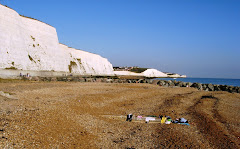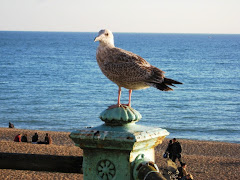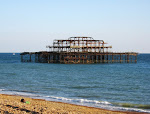One of the most rapidly growing hobbies in recent years has been genealogy. Inspired by the likes of the BBC programme, 'Who do you think you are?', and perhaps more so by putting UK census data on line a few years ago, this is now a burgeoning industry.
As well as finding out more about who you are (or at least who your ancestors were), it provides something of the thrill of the chase, and can easily get addictive. Of course, you have to be prepared for the odd surprise - illegitimacy and shot-gun marriages were common in the days before contraception, and the parish registers don't hold back: "Lucy, a base child, born of Jane Smith". Expect, too, lots of premature deaths and infant mortality. Parish registers can make harrowing reading in times of harsh winters, poor harvests and epidemics. Similarly, oral family history may have skated over periods spent in the work-house, suicides, and criminality.
But that's also half the fun: there's nothing more tedious than finding all your ancestors were worthy but dull peasants. If you are really lucky, and your ancestors were posh (and wealthy) enough, you may even find the odd will or tombstone. Equally, you'll find frustrating dead ends, as people moved around or changed their name, or simply because the records have been lost or mutilated. This is especially so for Ireland, where a lot of the records were destroyed in a disastrous fire at the main Archive in Dublin in the 1920s.
I have to confess at this point that I am a keen genealogist, having been inspired by my great Uncle's work, which was based initially on a few dog-eared pages from a family bible. Of course, this was all in the days before the web, so involved some hard slog around record offices, and trawling through endless census records on microfiche. But now, thanks to the web, things are much easier, at least in terms of starting off.
For a start, there are loads of web-sites. It's hard to pin it down to just a few, but a good place to begin is Ancestry.co.uk. Ancestry.co.uk has a complete and searchable database of transcriptions of the UK censuses from 1841 to 1901, and the index of Births, Marriages and Deaths (BMD), as well as other data. The former is great for identifying addresses and siblings you weren't aware of, whereas the BMD index can help narrow a search, although to get hold of a BMD certificate itself, you will need to order it from the site of the Government Register Office.
Some of the data on Ancestry.co.uk is free but, for most information, a subscription is required. Bear in mind that the transcriptions have a number of typographical errors - mostly due to mis-reading 19th century handwriting - and that spellings of surnames have always been somewhat variable, especially before 1900, when literacy rates were lower.
A free alternative to Ancestry.co.uk, at least for the index of Births, Marriages and Deaths, is the website FreeBMD. This has a searchable index and gives all the information you need to order a certificate, although not all the indexes have yet been transcribed. The site can also be rather slow, depending on the level of demand.
The census and BMD records should get you back to the 1840s, if you are lucky. Thereafter, the main source of information is the parish registers (and those of the Catholic and nonconformist churches), which in theory provide a record from the mid-1500s onwards. Some of these have been transcribed and put on-line, and the best place to find out whether this is the case is the wonderful GENUKI site. This lists every parish by county and country in the UK and Ireland, with details of all sorts of information, including the location of the parish registers - mostly in the relevant County Archives - and anything that has been placed on-line. This seems to vary hugely between Counties - Somerset and Gwent are very well covered, whereas Glamorgan and Devon are poorly represented. Genuki also lists a large number of other web-based resources, and - a real bonus - it's all free.
Another possible site is www.familysearch.org, belonging to the Church of Jesus Christ of the Latter Day Saints (Mormons). Their beliefs include posthumous baptism, so they have been researching data from the UK archives for a long time. Whatever you think of their beliefs, it provides an invaluable tool for tracing your family tree. The site is the main access point for the International Genealogical Index, or IGI, for short, which has been assembled by the work of individual members of their church, transcribing the entries from parish registers. Again, it is not perfectly transcribed, and coverage is very incomplete, so any details need to be double-checked from the original source, usually the relevant County Archive. But is great for finding information that can otherwise seem to be like looking for a small needle in a very large haystack.
The Parish Registers themselves are usually located at the various County Archives around the country. Much of my family came from Somerset, so the Somerset Record Office has been a regular calling spot. It is typical of many Record Offices; there is a distinctive procedure for using them which is best started by reading their web-sites thoroughly first, and then ringing up to book a space or micro-film in what is often a rather small search room. Only pencils are allowed, and there may be restrictions on taking bags etc in. You won't usually have access to the original - which is probably very fragile - but a photocopy or micro-film copy.
If it is your first visit, you will need to register for a Reader's Card, often referred to as a CARN (County Archive Research Network) card. This can be done on the spot. Take photo ID with your address - a driving licence is ideal. This is then valid for all UK Record Offices, for 4 years. The record offices have all sorts of fascinating local stuff besides the parish registers, and will usually have copies of the local census records as well.
Once you have your basic family tree, then you might want to flesh it out with details of work or military service. This can be done to some extent on-line, again through Ancestry.co.uk, but many records will require a visit to the amazing National Archive at Kew, in West London. Housed in an enormous modern building, set amongst attractive gardens and ponds, it's a very pleasant venue (and, for modern architecture, not half bad).
The contents are formidable, and include:
- Papers from the Central Courts of Law from the 12th century onwards
- Medieval records of central and local government
- An impressive collection of maps and plans
- Records of wills, naturalisation certificates and criminal records
- Service and operational records of the Armed Forces
- Foreign and Colonial Office correspondence and files
- Cabinet papers and Home Office records
- Statistics of the Board of Trade
- Other historic documents relating to a wide range of industry (mostly those which were nationalised at some point).
Using the facility is a little intimidating: you are strongly advised to look at their web-site first. (The motto here is to plan ahead, in all respects.) You have to have a National Archives Readers Ticket made up on your first visit, so you will need to bring with you various forms of ID. (This is to protect access to what is an incredibly valuable, and irreplaceable, collection of materials.)
Most people are looking for military records, and these are arranged in a separate room, and are generally easy to access. I was looking for some of these, but also the employment records of several Great and Great-Great Grandfathers who worked on the railways in the 19th and early 20th centuries. After a few hours' work, I had found them - and it was amazing - and a privilege - to handle such documents, and see their signatures. It was, I admit, an emotional moment.
So. What's stopping you? Who do you think you are?
Subscribe to:
Post Comments (Atom)



No comments:
Post a Comment